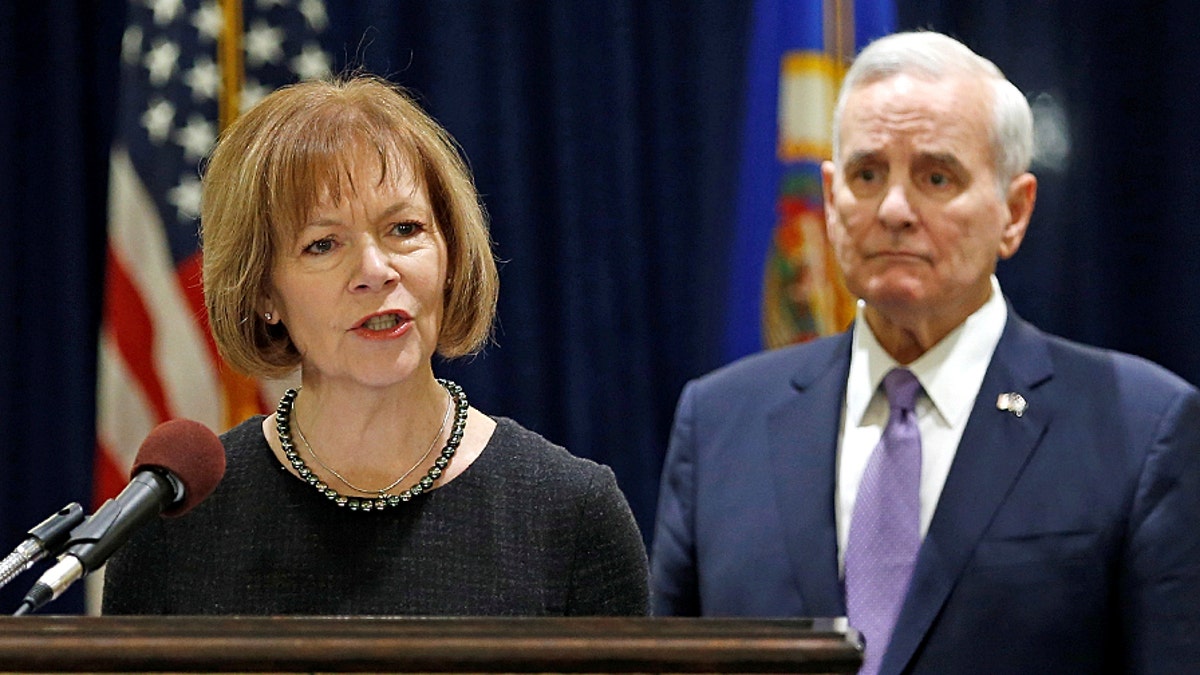Minnesota Senate candidate on Trump-Biden battling for state’s race
GOP Senate candidate Jason Lewis weighs in on ‘Fox & Friends Weekend.’
Democratic Minnesota Sen. Tina Smith is running in her second race in two years as she faces a tight contest with Republican rival Jason Lewis.
The senator previously served as chief of staff for Minneapolis Mayor R.T. Rybak, and chief of staff for Minnesota Gov. Mark Dayton in 2011. In 2014 she ran to for lieutenant governor and won with Dayton at the top of the state ticket. Dayton appointed her to fill the state's empty Senate seat at the end of 2017 after former Sen. Al Franken resigned amid sexual misconduct allegations.
In 2018, she won a special election to serve the remainder of Franken's term, which ends in January, and now she is running to serve a full six-year term.
Smith touts that as lieutenant governor, she helped bring free kindergarten to all Minnesota families, raise the state minimum wage, expand workers' medical leave, legalize same-sex marriage and invest in agriculture.
"In my first year in the Senate, I worked hard across party lines to get things done for Minnesotans. I’m not afraid to stand up for what I think is right for Minnesota, and I’m willing to work with anyone who wants to work with me to move good ideas forward," Smith's website reads.

Smith, seen here with Minnesota Gov. Mark Dayton, was named to fill Al Franken's seat. (REUTERS/Eric Miller)
Here are five things to know about Smith:
1. Smith was born in New Mexico
Smith, 60, was born in Albuquerque, New Mexico, and grew up in Sante Fe. She graduated from Stanford University and received her Masters in Business Administration from Dartmouth College before moving to Minnesota in 1984, taking a position in the marketing department at General Mills.
MINNESOTA SENATE RACE DRAMATICALLY NARROWS IN POLL BEFORE ELECTION
Smith eventually left the cereal giant and started her own small marketing and PR firm.
2. Smith worked for Planned Parenthood
The senator worked as vice president of public affairs for Planned Parenthood locations in Minnesota, North Dakota and South Dakota; she is the first senator to have worked for the organization.
Smith has voted against legislation that would pull Title X funding for Planned Parenthood and ban abortion after the 20th week of pregnancy.
3. Smith has focused on health care
The mother of two sons has also introduced bipartisan legislation and voted across party lines on issues like lowering drug prices, including the cost of insulin, and improving treatment and prevention measures for opioid addiction. As lieutenant governor, Smith helped the state reach one of the lowest rates of uninsured residents in the country, according to her website.
COURT RULING LEAVES MINNESOTA MAIL-IN BALLOTS IN LIMBO AFTER NOV. 3
Smith is also in favor of popular progressive policies including gun reform, making education more affordable, investing in clean energy, immigration reform and police reform.
4. Smith addressed the #MeToo movement after replacing Franken in 2017
Smith was selected to replace Franken in 2017 after he resigned following sexual misconduct allegations from a number of women.
TRUMP VOWS 'COMEBACK' IN CAMPAIGN'S CLOSING MESSAGE, CLAIMS BIDEN WILL 'LOCK DOWN YOUR STATE'
Franken said at the time that Smith's "record of accomplishment as lieutenant governor demonstrates that she'll be an effective senator who knows how to work across party lines to get things done for Minnesota."
During her first speech on the floor of the U.S. Senate, the newly appointed senator addressed the #MeToo movement against sexual assault.

Minnesota Lt. Gov. Tina Smith was selected by the state's governor to finish out Al Franken's term in the U.S. Senate. (Reuters/Alexandre Meneghini)
"I have always been surrounded by strong women and thoughtful men. I don’t have a horror story to share like the ones we have heard from so many women in the #MeToo movement," Smith said at the time "...But when you really listen to women, you begin to understand the million little ways in which all women are made less and denied the opportunity to contribute to their communities and their country.
5. Smith voted to impeach President Trump in 2019
Smith said during the impeachment hearings that she was "reluctant" to remove the president from office despite "strongly" disagreeing with the president "on many issues."
CLICK HERE TO GET THE FOX NEWS APP
"This changed when I read the whistleblower report, which alleged nothing less than the president's corrupt abuse of power," Smith said. "For me, this left no choice but for the House to fully investigate these allegations. When the House sent the two articles of impeachment to the Senate, it became my job to do impartial justice to the Constitution and the law, and I take that oath as seriously as anything I have ever done.














































